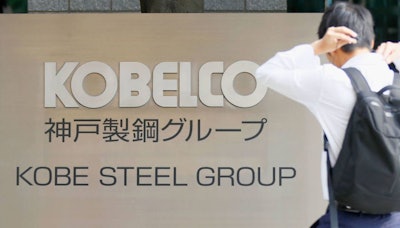
The Japanese government urged steelmaker Kobe Steel on Wednesday to clarify the extent of manipulation of inspection data on steel, aluminum and other metals used in a wide range of products, reportedly including rockets, aircraft and cars, in the latest quality scandal to rock Japanese manufacturing.
Kobe Steel, Japan's third-largest steel maker, has announced that between Sept. 1, 2016 and Aug. 31 of this year it sold aluminum and copper materials using falsified data on such things as the products' strength.
Deputy Chief Cabinet Secretary Kotaro Nogami told reporters the government was seeking more information about the problem and trying to determine its possible impact on product safety. He criticized the apparently widespread falsification of data as "inappropriate."
About 200 of Kobe Steel's customers, including some makers of defense equipment, were affected, Nogami said. He would not identify the companies by name but several automakers on Wednesday said they have been made aware of the problem and are investigating.
"We have confirmed that aluminum from Kobe Steel is used in the hoods and doors of some of our vehicles," Nissan said in an email. "As hoods are related to pedestrian safety, we are working to quickly assess any potential impact on vehicle functionality."
Toyota also confirmed that the material has been used in hoods and rear doors of some of its vehicles.
"Putting the utmost priority on the safety of our customers, we are rapidly working to identify which vehicle models might be subject to this situation and what components were used, as well as what effect there might be on individual vehicles," Toyota said in a statement. "At the same time, we are considering what measures need to be put in place going forward."
Aircraft maker Boeing said it, too, is looking into the problem.
"Boeing has been working closely and continuously with our suppliers since being notified of the issue to ensure timely and appropriate action, including comprehensive inspections and analysis throughout our supply chain," the company said in an email. "Nothing in our review to date leads us to conclude that this issue presents a safety concern, and we will continue to work diligently with our suppliers to complete our investigation."
Kobe Steel said in a release that the materials included aluminum flat-rolled products, aluminum extrusions, copper strips, copper tubes and aluminum castings and forgings.
It was unclear if the total of 40,900 tons of products involved included shipments to other countries.
"Data in inspection certificates had been improperly rewritten etc., and the products were shipped as having met the specifications concerned," the company said, describing the actions as "improper conduct."
The problem was discovered during internal inspections and "emergency quality audits," it said. Kobe Steel's share price has taken a beating, falling 17.8 percent Wednesday in Tokyo trading.
Product quality scandals have surfaced in Japan with increasing frequency in recent years. In one of the largest, auto parts maker Takata Corp. has paid $1 billion in penalties for concealing an air bag defect blamed for at least 19 deaths worldwide. Major automakers are also engaged in massive recalls and facing criticism for allegedly continuing to use the defective air bags despite knowing of the problem.
Last year, Mitsubishi Motors Corp. acknowledged it had systematically falsified mileage data on some of its vehicles. That company's reputation was hammered earlier by a massive, systematic and decades-long cover-up of defects that surfaced in the early 2000s.
In another major case, materials and chemicals maker Asahi Kasei Corp. found data had been manipulated in 360 projects out of 3,052, casting doubts on the strength of construction pilings.
A report on its investigation into the problem cited a slew of abuses, including outright swapping and falsification of data.
Kobe Steel said it was contacting its customers and working to verify the safety of the products it supplied.
"Verification and inspection to date have not recognized specific problems casting doubts on the safety of the nonconforming products," it said.
The company said it has set up a committee headed by its president to investigate quality issues and hired an outside law firm to conduct a probe into the misconduct.





















